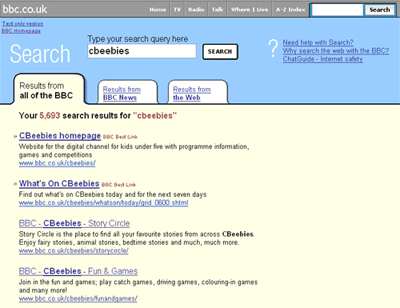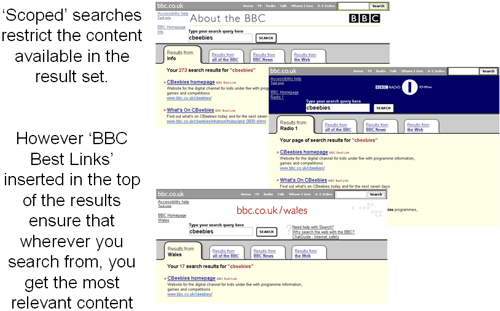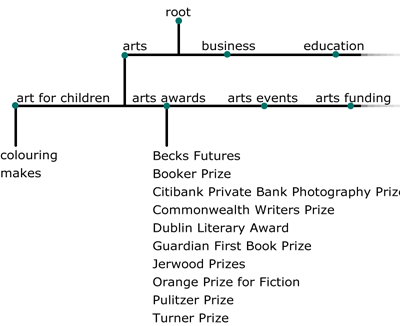Managing 'Glue' at the BBC: Search - part 3
This is page 3 of a 5 page article - 1 2 3 4 5
![]() Download a print version of this article
Download a print version of this article
Search
I want to move on to talk about search. You'll have noticed that there is a search box in the grey global navigation toolbar on bbc.co.uk, and that means that every page on the site has a search box on it, in the same place so that users know where to expect to be able to search from. Before we put this toolbar in place it was optional for sites to carry a search box, and they were able to put it anywhere on their site that they liked. Some made special search pages, some carried a box on every page, but some only had one search access point from their homepage, with no search option if a user got lost whilst browsing. The toolbar standardises the behaviour across the whole of the site.

We have an editorial process that puts 'best links' at the head of our search results pages. There is a very good reason for doing this. Across the site we have 'scoped' collections of the search index. For example if you are on the Radio One site and you search you will only get organic results back from the confines of the Radio One site. This limits our users to being able to explore little silos or sub-sets of the BBC's content. If you've navigated to that point, and know that you are looking for something on Radio One, then you will get the right results. However our search log analysis tells us that many people use search because they have navigated down a blind alley, haven't found what they wanted, or have navigated to where they expect to find the information and have failed. If you think back to how complicated the BBC is as an organisation, and that a lot of our content is presented to the public on our own organisational terms, then you can see the scope for users to fail to find the correct area when they are navigating is huge.
We add these best links in to make sure that wherever the user is within the BBC site, their search results will show them the major content areas that match their search query.

Behind the scenes this is powered by a taxonomy. In his IBERSID 2005 paper 'Revision of British Standards - BS5723 and BS6723' Dr Alan Gilchrist noted that only 14% of taxonomies in modern businesses are made by trained information specialists, and 40% plus are designed by line managers. I'm pleased to say that the BBC is one of the 14% that used trained information professional to build and mange the search taxonomy.
It is not, however, a perfect taxonomy, because it has to contain two quite distinct sets of content and perform two different functions. Firstly we have to map all BBC content, so in the Art area we have a node for "Art for children". These kind of artificial categories exist to accommodate specific types of BBC content, e.g. the kind of 'makes' on the Blue Peter site, or the print off colouring sheets available from CBeebies. At the same time, because we also offer a web search and a comprehensive news service, we also have nodes that are based in the real. So in the taxonomy we will have URLs for the official sites for literary and art prizes like the Orange Prize or the Turner Prize. As the taxonomy has to serve this dual purpose you couldn't describe it as a pure one.

One of the main themes I always think is important when looking at applying information science theory to either businesses or web sites, is that you have to sacrifice the purity of information professionalism for a pragmatism when working within businesses that may have marketing departments, branding guidelines, traditional classifications, imprecise audience understanding or a rigidly defined organisational structure. Inevitable you end up with a hybrid or compromise informational structure.
The administration system we use to control the taxonomy is illustrated here, showing the node for 'The Turner Prize'. To each node either BBC or non-BBC URLs can be attached, so for example here you can see links to the BBC's coverage of the Turner Prize, as well as links to the Turner Prize itself. Depending on whether the user is doing a relevant site search of bbc.co.uk or a web search from the BBC site, these URLs will be returned at the head of the results set. We also build the taxonomy with the ability to add children to any node.

Each node can also have synonyms attached to it. We use this to cope not only with genuine synonyms, but with misspellings. For example, in the UK we have a popular soap opera called EastEnders, but we know that some people search for it by the nickname 'easties', and some people when on the BBC site try to find the EastEnders content by searching for 'eastenders.co.uk'. We can set those as synonyms on the EastEnders node, so when people use these search terms, and our search engine is trying to match either 'easties' or 'eastenders.co.uk', we can ensure that the EastEnders homepage is top of the results via the taxonomy driven best links.
Continue to find out how the classification of content plays in role in being the glue that makes bbc.co.uk into one site.